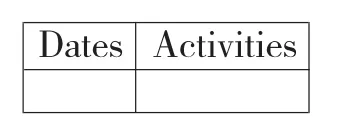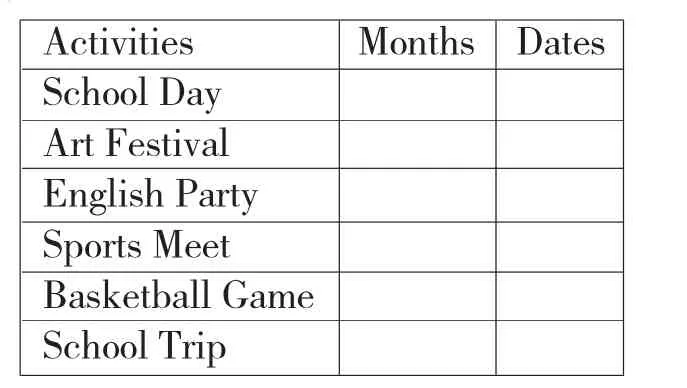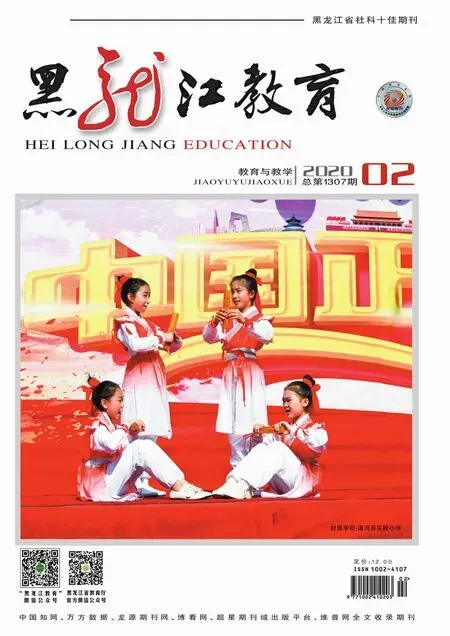基于『促进学生记忆英语词汇有效途径研究』的案例分析
2020-07-03哈尔滨市永源中学王松梅
哈尔滨市永源中学 王松梅
(此课选自人教版《英语》七年级下册Unit 8 When is your birthday。)
美国著名作家和教育家L-Ron Hubbar先生的教育学理论认为:影响理解和应用的最重要因素是词汇。在英语学习中掌握词汇数量的多少和运用词汇的熟练程度对语言交际能力、阅读能力和写作能力的培养有着直接的影响。那么如何在课堂上帮助学生更有效地记忆单词呢?
一、理论依据
Our memory is known as short term memory and long term memory,which is our capacity for recall of information minutes,weeks and years after the original input.Information stored in the memory falls into disuse unless it is activated fairly regularly.In other words,we need to practice and revise what we learn otherwise the new input will gradually fade in the memory and ultimately disappear.This is called the decay theory.If memory traces do gradually fade in the memory without regular practice then it is clearly necessary that we create opportunities in the classroom for students to practise what they have learned.
Recent trend in methodology have stressed the need for meaningful activities in the classroom.More meaningful tasks require learners to analyse and process language more deeply,which helps the students to commit information to long term memory.A student’s“personal investment”has a very positive effect on memorisation.
二、案例选材
本课话题为谈论日期,表述自己或家人、朋友的生日以及近期活动安排。
三、案例分析
【Section A活动设计】
新授词汇:12个月
(一)每日一报告
报告人借助日历提示单人汇报,其他学生在听后以相互问答的方式进行反馈。一方面训练学生通过听来捕捉和记录信息的能力,通过汇报和问答的方式训练说和输出信息的能力;另一方面可以激活学生已有词汇,预热主题情境,以便自然进入话题,为学习新单词和讨论新话题打下伏笔。此环节设计是教师半控制下的活动,报告人事先有所准备(语言材料和问题设置),目的是使所呈现的语言材料更丰富和准确,所提出的问题更合理。
1.One student do a daily report in the front and others listen to him or her carefully,then the reporter or the students can ask one or more questions about the report one by one.
2.After that,the teacher can ask the last question“Which month is it now?”At the same time,show the big calendar including twelve months in class to learn twelve months.
Activity I Do a daily report
Ask and answer about the daily report as much as possible.
Eg.1.What day is it today?
2.What’s the date today?
3.Which month is it now?
4.Do you like this month?Why or why not?
5.How’s the weather today?
6.Who is not here today?
7.How many classes do we have today?
8.Are there any activities today?
(二)以“话题”为依托,螺旋上升,层层递进
Activity II Talk about birthday
1.When is your birthday?(Work in pairs)
The teacher make a conversation with a student as an example,then work in pairs.
T:When is your birthday?
S:My birthday is in July.
2.When is her/his birthday?(work in groups with 4 students)
S1:When is your birthday?
S2:My birthday is in June.
S3:When is her/his birthday?
S4:Her/His birthday is in June.
3.Is her/his birthday in August?(work in groupswith 6 students)
S1:When is your birthday?
S2:My birthday is in August?
S3:When is her/his birthday?
S4:Her/His birthday is in August?
S5:Is her/his birthday in August?
S6:Yes,it is./No,it isn’t.It’s in September.
学习单词是一个过程。在教师的引导下,首先,通过简单的对话感知12个月的音和意,同时教师纠正发音;然后4人小组会话,由讨论自己的生日延伸到讨论他人的生日,重复新词;最后,6人小组会话,用不同的句式谈论你、我、他的生日,学生自主地运用新词,新旧词汇交替出现,循环往复,但绝不是同一个词的机械重复,而是在使用不同的句式谈论不同的人。当学生能辨认和理解一个词,这个词就成为被动词汇(passive vocabulary),当学生能在听和说中使用它,这个词就从被动词汇变成了主动词汇(active vocabulary),词汇教学的目的就是让最普通的词成为学生的主动词汇。在这个循环往复中,12个月份应该成为学生的积极词汇。
Activity III A guessing game about months.
S1:Which month comes before February?
S2:January.J-A-N-U-A-R-Y.Which is the hottest month of a year?
S3:Do you like swimming? You can swim in this month and it’s not cold...
男女生PK参与活动,两人背对白板(展示某个月份),下面的同伴描述这个月份,肢体和语言可以并用,还必须适当地用英语交流互动,让台上伙伴猜出这个月份并拼写该单词。这个游戏的设计符合学生的年龄特点,更重要的是抓住了学生的兴趣点,教师大胆放手,学生对12个月的记忆痕迹得到了强化。
此环节是开放性的活动生成部分。在了解一个词的基本音形意后,在语境中循环使用它,扩展相关知识,可以强化对这个词的理解和记忆。
【Section B活动设计】
新授词汇:English test,school trip,party,basketball game,soccer game,School Day,English Day.
(三)借图说话,传情达意
Activity I Get to know some events
1.Discuss these pictures
T:What can you see in the picture? What are they doing?
S:......
(showing some pictures one by one and talking about them asmuch aspossible.)
2.Match the pictures with the events
(1)English test (6)Book sale(2)School trip (7)English Day(3)Party (8)Art festival(4)Basketball game (9)Sports Day(5)School Day
利用画面的信息情境展开联想,表达对画面的理解和知识延展,以便进入课堂情境:谈论事件发生的日期以及近期的活动安排。教师适当介绍学生不够了解的活动,以免学生产生思维定式;图文匹配,明确相关活动的英文表达和活动的意义,引导学生读准每个活动的名称。
(四)创编“语块”,交流更顺畅
Activity II Associative memory
1.English test——Chinese test,math test,P.E.test,drawing test,Japanese test...
2.School trip——bus trip,train trip,bike trip,plane trip...
3.Party——birthday party,dancing party,singing party,school party,New Year’s Party...
4.art festival——Spring Festival,Mid-autumn Festival...
5.soccer game——basketball game,volleyball game,badminton game,ping-pong game...
最后,引导学生举一反三,运用新旧词汇合理搭配生成新的语块,此时学生再有兴趣地主动创造,不仅扩大了词汇量,更有利于对新单词的长久记忆。
学生在了解了词语的基本意义后,教师提供各种各样的活动和情境让学生主动参与语言实践反复使用这些新的词汇,这会有助于他们把新词汇转化成积极词汇,从而促进新单词的记忆。学生的个人投入对记忆单词也更有积极的影响。以下从听读写的活动设计方面分析如何有效记忆单词。
四、用语言做事情:听读写活动中记单词
Activity III.Listen and finish the following tasks
1.Listen and circle the events you hear
(1)English test(2)Party(3)English Day(4)Sports Day
(5)School trip (6)Basketball game(7)Art festival
2.Listen again and fill in John’s calendar.
通过听来巩固理解词汇:1.带着任务听会话,此任务能力要求比较低。一方面训练学生通过听来捕捉和记录信息的能力;另一方面可以起到再认识刚接触的词汇,在特定的情境中进一步理解词语。2.继续带着任务听对话,能力要求提高,学生既要写出表述事件的短语,又要听清楚具体的日期,需要高度的注意力。教师可提示学生用字母来代替事件,之后再转换成相应的短语。通过此活动,帮助学生建立上述短语的音和形的联系。通过听,学生们会更关注“任务”的过程和结果,所学单词不再是“单打独斗”,而是“合作共赢”!

Dates Activities
ActivityⅣ.Read the school notice
1.Skim the notice and list the activities and the dates.
通过“读”来强化应用词汇。带着目的阅读文本,引导学生抓关键词(本课的新词汇和重点词块)来搜寻所需信息,并通过完成表格的形式反馈,更重要的是在解决实际问题中应用了所学词汇,有效提高了相关单词的复现率,有助于进一步长久记忆所学的词汇。
2.Ask and answer the questions about the notice.
T:1)How many activities do they have this term? What are they?(细节信息)
2)How many activities do they have in September? What are they?(细节信息)
3)How many activities do they have in October/November/December?What are they?(细节信息,分析归纳)
4)Which month has the most activities? Are the students busy?(比较,判断)
5)Do you think the students will have a good time this term?(推测,推理)
Ss:......
T:Can you show your questions to us?
教师设计有梯度的问题,引导学生搜寻归纳语篇信息,巩固对生词的理解,学生对文本提出问题,用不同的思维形式研读文本,再次强化对月份、活动等新单词的理解和记忆。通过控制性的问题,学生对词汇的理解不再停留在基本层面,而是要运用词汇对文本信息进行搜寻查找、分析归纳、推理判断和质疑。
3.Order the activities in the form according to your most interested and least interested.And tell your teacher and classmates the reason if you like.
改变思维模式,设计开放性活动,换种思维方式处理信息,学生对词汇的学习已经完全脱离书本,主动选择,精心判断,再次通过“用语言做事情”巩固记忆所学词汇。

Activities Months Dates School Day Art Festival English Party Sports Meet Basketball Game School Trip
Activity V Be the owner of my school
Finish the following form,then write a notice.
Dear students,We have many interesting and fun activities for you to do this term......
通过“写”的活动应用所学词汇。学生假设自己是某学校校长,为该校学生安排本学期的活动。学生四人一组讨论方案,在组内完成以上信息表,作为写作提纲,然后以本课通知语篇为模板,写一份学校通知。最后请一名学生朗读,向全班发布。本活动目的是创造性地使用活动名称及日期的表达法,促进语言的形成,同时提高学生的主人翁意识,培养合作精神。通过创造性的活动鼓励学生用自己的想法做事情,这个活动具有很强的交际性,需要团队合作完成,真正体现“用语言做事情”的教学真谛!
通过以上词汇教学中的方法分析,希望能和大家一起交流英语词汇教学的困惑与感悟,改变当下学生低效率的英语学习现状,更希望能引起大家的思考,如何使我们的英语学习在科学的方法引导下取得事半功倍的效果,真正落实新课标实现学生英语学习方式的变革。初中英语词汇教学是一项长期而又复杂的过程,需要英语教师在今后的教学中,根据教学对象的实际情况,取多家之长,灵活采用教学策略,不断提高词汇教学效率,促进学生更好地学习英语。
